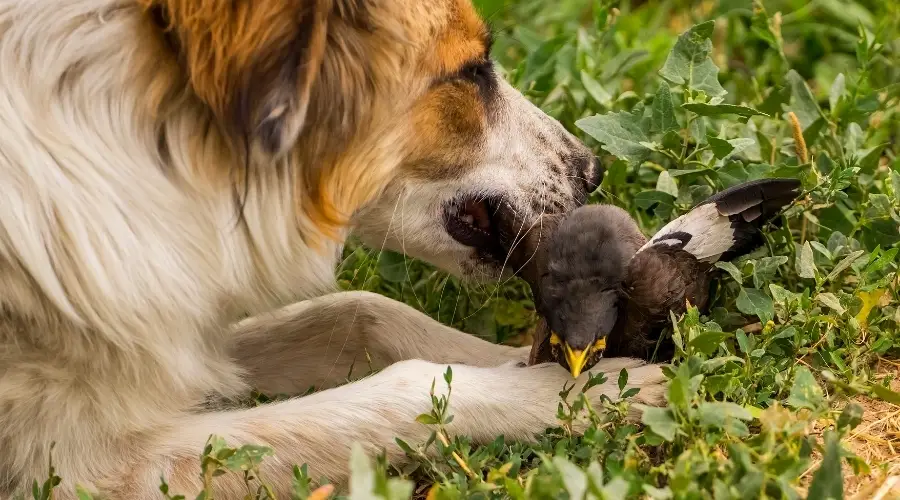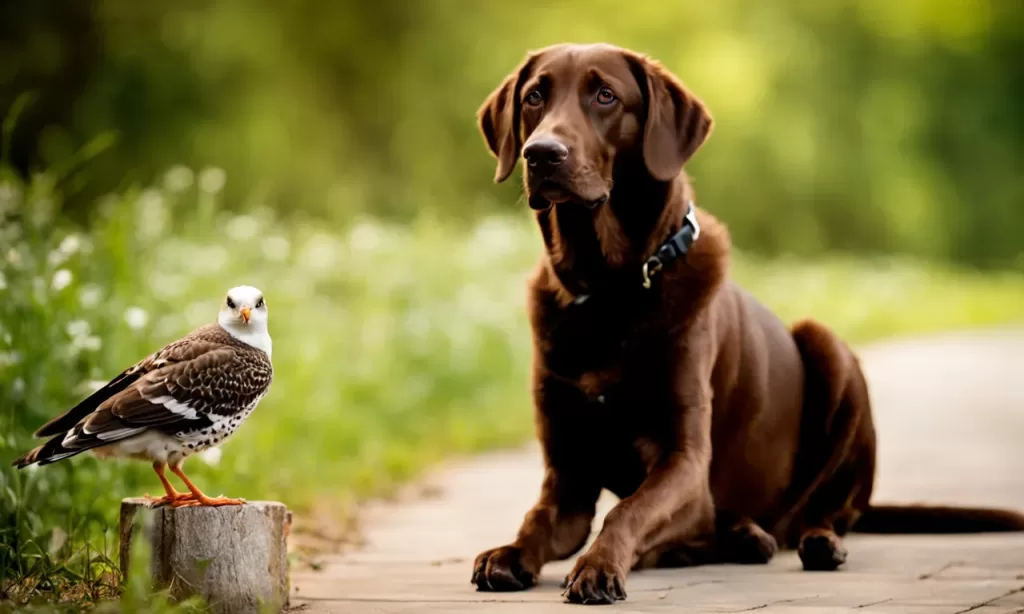My dog killed a bird, a big concern, right? As a dog owner, it can be distressing to come home to find your furry friend has killed a bird. But don’t panic.
Table of Contents
While it’s natural for dogs to chase and kill prey, there are steps you can take to protect your dog, the birds in your community, and your own emotional well-being.
Immediate Actions After Your Dog Kills A Bird
Safely handle the dead bird. Put on gloves and use a shovel or bag to carefully pick up the bird. Place it in a sealed container and dispose of it properly. This will help prevent the spread of disease.
Check your dog for injuries. Examine your dog’s mouth and body for any cuts or wounds. If you find anything, clean it thoroughly with soap and water and contact your veterinarian.
Disinfect the area. Use a pet-safe disinfectant to clean the area where the incident occurred. This will help remove any bacteria or parasites that may have been present on the bird.
Watch for sickness. Monitor your dog for any signs of illness, such as vomiting, diarrhea, lethargy, or loss of appetite. If you notice any of these symptoms, contact your veterinarian immediately.
Discourage hunting behaviors. There are a few things you can do to discourage your dog from hunting birds, such as:
- Keeping your dog on a leash when walking in areas with birds
- Training your dog to recall reliably
- Providing your dog with plenty of exercise and mental stimulation
- Using positive reinforcement to reward your dog for good behavior
Protect local birds. If you have a bird feeder, make sure it is placed in a location where your dog cannot reach it. You can also plant bird-friendly plants and shrubs in your yard to provide birds with shelter and food.
Understand your dog’s predatory drives. Dogs are predators by nature, so it’s important to understand their instincts. While you may not be able to completely eliminate your dog’s desire to chase birds, you can take steps to manage it.
Also Read: 5 Best Dog Beds for Chewers and Aggressive chewers
Coping emotionally
It’s normal to feel upset or even guilty if your dog kills a bird. Remember that you’re not alone. Many dog owners have experienced this at some point. Here are a few tips for coping emotionally:
- Allow yourself to grieve. It’s okay to feel sad, angry, or frustrated.
- Talk to someone you trust about how you’re feeling. This could be a friend, family member, therapist, or other dog owner.
- Focus on the positive. Remember that your dog loves you and wants to please you.
- Take steps to prevent it from happening again. Follow the tips above to discourage your dog from hunting birds.
Signs of Illness to Watch Out For When Your Dog Kills a Bird

Here are some of the most common signs of illness to watch out for when your dog kills a bird:
- Gastrointestinal problems: Vomiting, diarrhea, and loss of appetite are all common signs of gastrointestinal distress. If your dog experiences any of these symptoms, it’s important to contact your veterinarian immediately.
- Lethargy and weakness: If your dog is noticeably lethargic or weak, it could be a sign of illness. This is especially concerning if your dog was previously active and energetic.
- Fever: A fever is another sign of illness in dogs. If your dog’s temperature is higher than 103 degrees Fahrenheit, contact your veterinarian.
- Respiratory problems: Coughing, sneezing, and difficulty breathing are all signs of respiratory problems. If your dog experiences any of these symptoms, it’s important to take them to the vet right away.
- Neurological problems: Neurological problems, such as seizures, tremors, and loss of coordination, can be caused by a variety of factors, including illness. If your dog experiences any of these symptoms, it’s important to take them to the vet right away.
Steps in Preventing Your Dog From Killing Birds
Here are some steps you can take to prevent your dog from killing birds:
- Train your dog to recall. A reliable recall is the best way to prevent your dog from chasing birds. If your dog is trained to come back to you when you call, you can easily prevent them from going after a bird.
- Keep your dog on a leash when walking in areas with birds. This is especially important if your dog has a history of chasing birds. Even if your dog has a good recall, it’s always best to be safe.
- Supervise your dog when they are in the yard. If you can’t watch your dog closely, keep them in a fenced-in area. This will prevent them from wandering off and chasing birds.
- Remove bird feeders from your yard. Bird feeders attract birds, and birds attract dogs. If you have bird feeders in your yard, it’s more likely that your dog will chase birds.
- Plant bird-friendly plants and shrubs in your yard. Bird-friendly plants and shrubs provide birds with shelter and food, which can encourage them to stay away from your dog.
- Teach your dog to “leave it.” This command can teach your dog to ignore birds and other distractions.
- Use positive reinforcement. When your dog is behaving well around birds, reward them with praise, treats, or petting. This will help them learn that ignoring birds is good behavior.
If you have taken all of these steps and your dog is still killing birds, it’s important to talk to your veterinarian. They may be able to offer additional advice or help you find a qualified dog trainer.
It’s also important to be patient. It may take some time for your dog to learn to ignore birds. But with consistent training and positive reinforcement, you can help your dog learn to be a good bird neighbor.
Conclusion
If your dog kills a bird, it’s important to take steps to protect your dog, the birds in your community, and your own emotional well-being. By following the tips above, you can help prevent future occurrences and manage your dog’s predatory drives.

